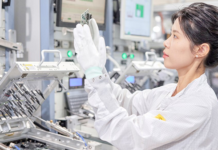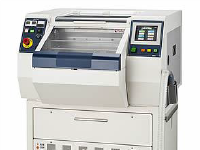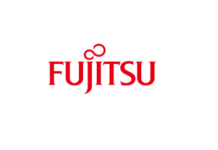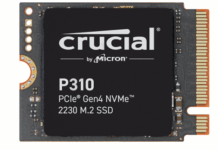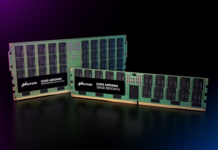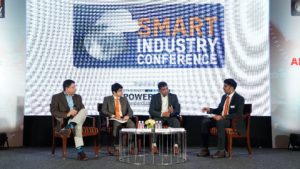
In order to spread awareness of the latest technologies and open source solutions that empower Indian machine builders and factories to implement advanced automation solutions, the Ethernet POWERLINK Standardization Group has been organizing the Smart Industry Conference for the past 5 years. The fifth edition of the Smart Industry Conference in Pune centered around bringing digital transformation to the Indian manufacturing market cost-effectively. Partners of the Smart Industry Conference included ABB India; Unlimit IoT, a Reliance Group Company; and B&R Industrial Automation. C4i4Lab, a world class center promoting innovation and adoption of Industry 4.0 solutions, was the supporting organization of the conference in order to enhance global competitiveness of Indian industry.
Importance of digital transformation in making factories future-ready
Digital factories are no longer fiction but a reality. Concepts such as digitalization, Industry 4.0 and smart manufacturing have gained traction in India to increase effectiveness and efficiency. Customers are demanding fast delivery of top-quality products, while manufacturers strive to operate at minimal costs. The focus is therefore on increasing production and profitability with existing infrastructure.
The conference started with a presentation on “Digitalization across the value chain” by Subrata Karmakar, LBL Manager, ABB Robotics and LSM, ABB RA India. He described how factories are shifting toward agility – with low volume, high mix and shorter cycles. Digitalization will bring manufacturers even closer to the customer and will be a key driver of future growth. In this journey, robotics will play a vital role in providing digital solutions at every level.
This was followed by presentation on “Digital transformation – Making factories future ready”, delivered by Prabhat Singh Sengar, Sales, Process and Factory Automation, B&R Industrial Automation. Manufacturers are trying to improve shop floor efficiency and need to look at factors such as optimizing plant performance and availability, optimal utilization of energy and production resources and minimizing maintenance costs. Speaking on edge architectures, Sengar explained how these middleware solutions enable factories to become smart and go a long way to improving efficiency. He concluded with an intriguing case study of an Indian tier-2 supplier of renowned multinational and Indian automotive manufacturing units. By implementing B&R’s APROL solutions, the user has integrated all possible components in their factory, which are now being monitored 24/7. This has helped them to achieve higher productivity and OEE and reduce wastage, inventory costs and losses.
Transforming the manufacturing ecosystem with Industrial IoT
A panel discussion on the subject “Key strategies for end-to-end Industrial IoT implementation and its value proposition” was conducted by Ranjithkumar G, Specialist – Technology and Network, B&R Industrial Automation. The prominent panelists for the discussion were Subrata Karmakar, LBL Manager, ABB Robotics and LSM, ABB RA; Pravin Bambal, Vertical Head (I4.0), Unlimit IoT and Tanay Sil, Head – Business Development, B&R Industrial Automation.
Industrial IoT will definitely be trending for the next decade and will affect virtually every industry vertical and permeate entire business processes. The Industrial IoT is an integral component of a broader digital transformation. There are many motivations for implementing Industrial IoT – from strengthening customer engagement and loyalty to accelerating market penetration and global competitiveness, as well as enhancing operational efficiency, organizational effectiveness and profitability.
As the benefits of Industrial IoT become more widely understood, the pertinent challenge for many companies is how to implement the associated solutions. They grapple with questions such as how and where to start and which skills and technology partners are needed. After pointing out these issues, the moderator asked the panel to describe one strategy for Industrial IoT implementation that has proven effective in their experience. The panel agreed here that selecting the right technology partner and the right communication protocol are crucial elements to ensuring long-term ROI.
The panel also deliberated on “How to acquire meaningful data from brownfield installations and use it for decision-making” since data engineering is gaining importance today. It is significant to have a checklist and know which data is relevant for clients. The challenges faced by brownfield facilities need to be solved through customized digitalization strategies. Acknowledging these challenges, Tanay Sil introduced B&R’s Orange Box as an effective solution that can help connect these digitally isolated machines and provide Greenfield benefits. Topics such as the significance of open technology, data reliability, safety and security were also discussed.
Data engineering and open communication technology
The final session of the conference focused on data engineering as a driver for digitalization. Taking up the topic, Robin Dmello, GM, Unlimit IoT, discussed some of the problems companies face when they collect and store data – particularly in an era when our machine learning models require huge amounts of labeled data. While discussing the next big transformational change, he gave an example of rising demands of various cognitive features in connected cars. Hidden in the data are valuable clues to the vehicle’s performance and health, which can be used to provide a better driver experience and improve vehicle quality and reliability.
The latter half of the session saw a presentation on “Industrial interoperability from the sensor to cloud” by Ranjithkumar G, Specialist – Technologies and Network, B&R Industrial Automation. He spoke about the benefits to industrial automation offered by OPC UA over TSN, the undisputed Industrial IoT highway. He described OPC UA over TSN as an open, unified standard for Industrial IoT communication, suitable for applications on the factory floor or in converged IT/OT ecosystems with seamless connectivity from the sensor to the cloud.
This year’s Smart Industry Conference gave participants a roadmap for successful digital transformation with a focus on the perspective of the Indian market, informed by global trends and technologies. The conference offered a mix of technical presentations, panel discussions and demos, each aimed at different aspects of the connected factory. With around 150 delegates, the conference provided a wealth of know-how on the topics of automation, Industrial IoT and digitalization and showcased successful implementations from Indian shop floors and factories.
A panel discussion at the Smart Industry Conference addressed “Key strategies for end-to-end Industrial IoT implementation and its value proposition”.



